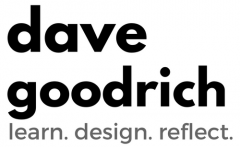Welcome to the very first episode of “Just Another Dave,” a podcast that explores the complex and often perplexing world of copyright. A special thanks to Tracy Balduzzi, a people connector and aspiring world traveler from Syracuse University who I met last week at OLC Accellerate in Washington D.C. and who encouraged me to do this. I honestly wouldn’t have without her nudging. So, thank you. In this inaugural episode, we delve into the age-old wisdom of “nothing new under the sun” and examine how copyright intersects with our quest for knowledge and creativity.
Episode 001 Outline
Nothing New Under the Sun
I start by contemplating the ancient wisdom of Ecclesiastes 1:9, which reminds us that there is “nothing new under the sun.” This timeless concept lays the foundation for our discussion on copyright, where the old meets the new.
Re:mix Assignment
Reflecting on my recent experiences in school, I discuss the “re:mix assignment,” wondering if I should be taking courses I have taught before. I’m wondering about the importance of honesty about my learning journey being key as I explore the evolving landscape of copyright. I resonate with Ecclesiastes 1:18, which warns that “the more knowledge, the more grief.”
The Internet’s Own Boy
In this section, I link copyright to the story of “The Internet’s Own Boy,” underlining the significance of intellectual property and how knowledge can sometimes bring misery.
Imposter Syndrome
I explore the concept of imposter syndrome in the context of copyright, discussing the challenges of individuality, standing out in the world, and the multiplicity of ideas that share the same name. I’m pondering the age-old questions: “Who am I?” and “Where did I come from?” and “Where am I headed?”
Artificial Intelligence
I begin a very brief dive into the questions raised when we explore the implications of artificial intelligence on copyright and intellectual property.
All Things New
I wrap up by reflecting on the idea of singing “to the Lord a new song” and the potential for innovation and change in the realm of copyright.
Bob Dylan
Finally, I conclude with an inspirational Bob Dylan video that echoes the themes of creativity and originality in the world of music and art.
Conclusion:
Join me on this intellectual journey as I embark on “Just Another Dave.” In this podcast, I’ll explore the intersections of copyright, education, and technology, drawing on timeless wisdom, modern insights, and thought-provoking discussions. Stay tuned for future episodes that promise to be as honest and raw as they are entertaining.







 Knowledge for Sale
Knowledge for Sale STEM Alliance Fall Reception
STEM Alliance Fall Reception
